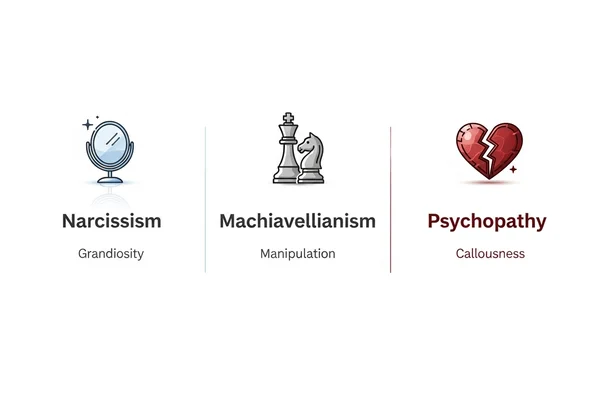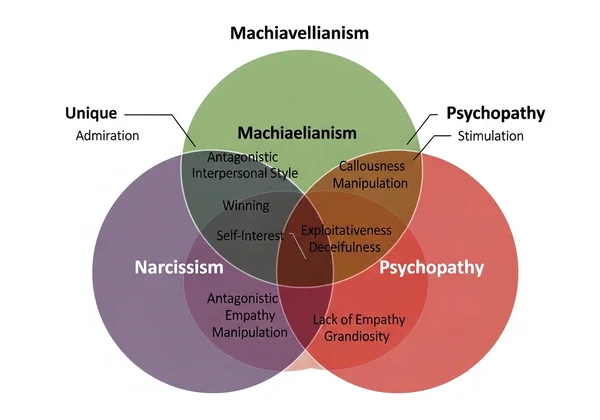The Dark Triad: Psychopathy, Narcissism & Machiavellianism | Take Our Online Psychopathy Test
Have you ever encountered someone whose behavior felt consistently manipulative, self-absorbed, or emotionally cold? Understanding the intricate dynamics of human personality can be challenging, especially when faced with traits that are socially abrasive. What is the Dark Triad, and how can it provide a framework for decoding these complex behaviors? This psychological concept groups together three distinct yet overlapping personality traits: Narcissism, Machiavellianism, and Psychopathy.
This article will guide you through the core components of the Dark Triad personality, exploring what each trait entails, how they differ, and why recognizing them matters. For those seeking a deeper understanding of their own personality landscape, a scientifically-inspired assessment like a psychopathy test can be a valuable first step. You can begin to explore your traits with a confidential online tool.

Understanding the Dark Triad Personality Framework
The Dark Triad is not a clinical diagnosis but rather a constellation of personality traits studied by psychologists to understand darker aspects of human nature. Coined by researchers Delroy Paulhus and Kevin Williams in 2002, this framework helps explain a tendency towards self-promotion, emotional coldness, duplicity, and aggressiveness.
Defining the Dark Triad: Origins and Purpose
The purpose of this framework is to identify and study three specific malevolent personality traits that often appear together. While each has unique features, they share a common thread of antagonistic and self-serving interpersonal styles. Understanding these traits helps psychologists and individuals alike recognize patterns of behavior that can be detrimental to relationships, workplaces, and personal well-being. It provides a language to describe actions that might otherwise seem confusing or unpredictable.
The Core Elements: A Snapshot of Each Trait
At a glance, the Dark Triad consists of three key elements:
- Narcissism: Characterized by grandiosity, a sense of entitlement, and an intense need for admiration.
- Machiavellianism: Defined by a cynical worldview, strategic manipulation, and a focus on personal gain above all else.
- Psychopathy: Marked by a profound lack of empathy, high impulsivity, and antisocial behavior.
While this provides a basic overview, diving into the specifics of each trait reveals their unique complexities.

Exploring Each Dark Triad Trait in Detail
To truly grasp the concept, we must look at each trait individually. These are not simply labels but descriptions of deep-seated behavioral and emotional patterns that exist on a spectrum.
Narcissism: Grandiosity, Entitlement, and Superficial Charm
Narcissism is perhaps the most well-known of the three. It revolves around an inflated sense of self-importance and a constant craving for attention and validation. Individuals high in narcissistic traits often present a charming and confident exterior, but this facade hides a fragile ego that is highly sensitive to criticism. Their sense of entitlement leads them to believe they deserve special treatment, and they often exploit others to satisfy their need for admiration.
Machiavellianism: Calculated Manipulation and Cynicism
Named after the political philosopher Niccolò Machiavelli, this trait is rooted in a strategic and exploitative approach to life. People high in Machiavellianism are master manipulators who view others as pawns in their personal chess game. They are patient, calculating, and willing to deceive or flatter to achieve their long-term goals. Unlike narcissists, their actions are rarely driven by ego; they are motivated by a cynical belief that the ends always justify the means.
Psychopathy: Callousness, Deceit, and Impulsivity
Psychopathy is arguably the darkest of the triad, characterized by a severe deficit in empathy and remorse. This emotional coldness allows individuals with psychopathic traits to harm or deceive others without guilt. They are often impulsive, seek thrills, and display a parasitic lifestyle. While fictional portrayals often depict violent criminals, psychopathy exists on a spectrum. Many individuals with these traits may not be violent but can cause significant emotional and financial harm in their interpersonal relationships. If you are interested in where you might fall on this particular spectrum, the psychopathy test can offer initial insights.

Overlaps, Distinctions, and the Dark Triad Spectrum
It is crucial to understand that these three traits are not mutually exclusive. An individual can display characteristics of all three, which is why they are studied together as the Dark Triad.
Where Traits Converge: Similarities and Shared Behaviors
The common ground for all three traits is an antagonistic interpersonal style. This includes a tendency towards disagreeableness, manipulation, and a primary focus on self-interest. Whether for ego, strategic gain, or thrill-seeking, individuals high in any of these traits prioritize their own needs over the well-being of others. This shared core of antagonism is what makes the Dark Triad a cohesive concept.
Unpacking the Differences: Beyond the Surface
Despite their similarities, key distinctions exist. A narcissist wants to be admired, a Machiavellian wants to win, and a psychopath wants stimulation. For example, a narcissist might lie to boost their image, a Machiavellian might lie as part of a long-term plan, and a psychopath might lie for the simple pleasure of it, with no clear goal. Understanding these motivations is key to differentiating the traits. For a clearer picture of your own patterns, you can start exploring with our assessment.

Why Understanding the Full Spectrum Matters
Viewing these traits as part of a spectrum is essential. Very few people are "pure" narcissists, Machiavellians, or psychopaths. Most of us have some of these traits to a minor degree. Problems arise when these traits are pronounced and rigidly applied across all situations, causing harm to oneself or others. Acknowledging the spectrum helps us move beyond simple labels and fosters a more nuanced understanding of human personality.
Identifying Dark Triad Traits and Seeking Insights
Recognizing these patterns is the first step toward navigating them effectively, whether in yourself or in others. The goal is not to diagnose but to gain clarity.
Recognizing Patterns in Relationships and Interactions
Look for consistent patterns rather than isolated incidents. Is someone constantly seeking the spotlight and devaluing others (narcissism)? Do they consistently use manipulation and flattery to get what they want (Machiavellianism)? Or do they seem incapable of empathy and act recklessly without remorse (psychopathy)? Identifying these recurring behaviors can provide valuable information about the dynamics at play in a relationship.
The Value of Online Assessments: Starting Your Exploration

While not a substitute for professional clinical evaluation, online assessments can be a powerful tool for self-reflection. A dark triad test or a focused psychopathy test can provide a structured way to examine your own traits and behaviors. These tools offer a private, accessible starting point for anyone looking to gain personal insight. Our free online test is designed based on scientific principles to provide a preliminary screening.
Gaining Clarity on Complex Personalities
The Dark Triad provides a compelling lens through which to view some of the more challenging aspects of human personality. By understanding the unique characteristics of Narcissism, Machiavellianism, and Psychopathy—as well as their overlaps—we can better navigate our social world. Knowledge empowers us to recognize manipulative behaviors and protect our well-being.
If this exploration has sparked your curiosity about your own personality profile, remember that self-awareness is a journey. Taking the first step can be illuminating. We invite you to take our free test to receive a preliminary assessment and consider the optional AI-powered report for even more personalized insights.
Common Questions About the Dark Triad and Psychopathy
What is the main difference between psychopathy and narcissism?
The core difference lies in motivation and emotional capacity. Narcissism is driven by a need for admiration and the maintenance of a grandiose self-image. Psychopathy is defined by a fundamental lack of empathy, guilt, and deep emotional connection. A narcissist might hurt you to protect their ego, while a psychopath might hurt you out of boredom or impulsivity, feeling nothing afterward.
Are people with Dark Triad traits inherently 'bad' or dangerous?
Not necessarily. These traits exist on a spectrum. While high levels are associated with harmful behaviors, having some of these traits does not automatically make someone "bad" or dangerous. Many individuals with these traits function within society without breaking laws, though they may still create toxic interpersonal environments. The key is the intensity of the traits and how they manifest in behavior.
Can an online test truly identify Dark Triad traits?
Online tests like ours serve as valuable screening tools, not clinical diagnoses. They can accurately indicate the presence and level of certain traits based on your self-reported answers. They are an excellent starting point for self-exploration and can highlight patterns you may not have noticed. For a more comprehensive analysis beyond a simple score, our optional AI report offers deeper insights into your unique personality structure.
How does the Dark Triad relate to antisocial personality disorder?
Antisocial Personality Disorder (ASPD) is a formal clinical diagnosis found in the DSM-5. Psychopathy is a personality construct that has significant overlap with ASPD, particularly in its behavioral aspects (e.g., deceitfulness, impulsivity). However, psychopathy places a greater emphasis on emotional deficits like lack of empathy and guilt. Many, but not all, individuals with high psychopathy scores would also meet the criteria for ASPD.
Are Dark Triad traits something people are born with, or do they develop over time?
This is a classic "nature vs. nurture" debate. Current research suggests it's a combination of both. There appears to be a genetic predisposition for these traits, meaning some individuals are born with a temperament that makes them more susceptible. However, environmental factors—such as upbringing, childhood trauma, and social learning—play a crucial role in how these traits develop and are expressed.